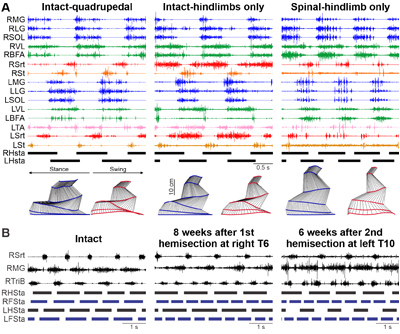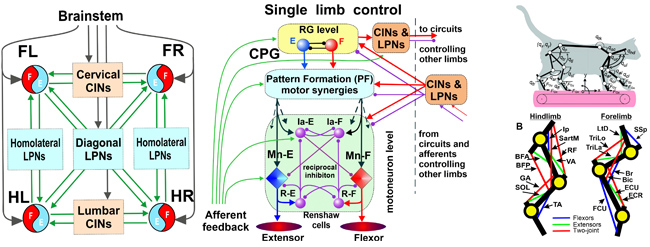NIH/NINDS R01 NS110550; 02/15/2020 - 01/31/2025
PIs: Rybak IA; Frigon A, Prilutsky BI
Interlimb coordination is essential for maintaining balance when navigating in complex and/or changing environments. It involves complex dynamic interactions between neural circuits at different levels of the nervous system and biomechanical properties of the musculoskeletal system to allow animals to adjust locomotor speed and gait for goal-oriented behaviors. Interactions within the nervous system include those between the spinal circuits controlling each limb, supraspinal inputs and sensory feedback from the limbs.
Despite their obvious importance, the mechanisms that control interlimb coordination and contribute to locomotor recovery following SCI and other neurological disorders remain poorly understood. To address this gap in knowledge, we will integrate multiple experimental and modeling approaches to investigate the neural and biomechanical mechanisms controlling interlimb coordination in a feline model before and after SCI disrupting neural communication between the brain and spinal cord and/or between the circuits controlling fore- and hindlimb movements.
The project will be performed in close interactive collaboration between three groups of investigators with strong and complementary expertise in the experimental study of cat locomotion, including SCI models (Alain Frigon, Universit de Sherbrooke, Canada), biomechanics of cat locomotion (Boris Prilutsky, Georgia Tech) and neural control of locomotion (Ilya Rybak, Drexel University). Results obtained from these studies will have an important theoretical impact on our understanding of how the limbs are coordinated during locomotion and how this coordination is altered and adjusted after disruption of spinal pathways between left-right or cervical-lumbar circuits. The results will identify neural pathways and biomechanical mechanisms that could be targeted to improve interlimb coordination in people with various movement disorders, such as SCI, stroke, and Parkinson's disease.
Learn more at grantome.com.

Click on image to view larger.

Click on image to view larger.

Contact Us
The Laboratory for Theoretical and Computational Neuroscience
Department of Neurobiology and Anatomy
Drexel University College of Medicine
2900 W. Queen Lane
Philadelphia, PA 19129
For more information, please contact
Ilya A. Rybak, PhD
Professor
215.991.8596
rybak@drexel.edu
Quick Links & Resources